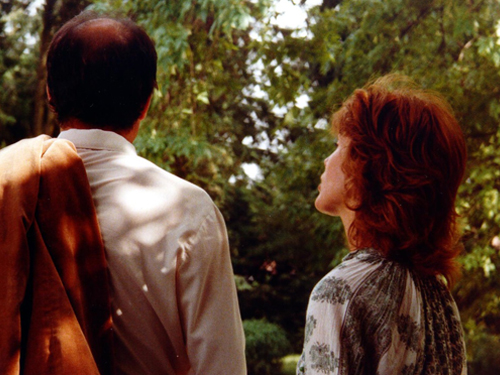
“Before being a short film, How Can I Love by Anne-Marie Miéville is cinema – and a personal kind of cinema at that. It goes straight to the essence, without frills, and (something quite rare for a first fiction film) without any self-protection. In this film, Anne-Marie Miéville confronts cinema at its riskiest: going to the core of a delicate situation and filming it directly, head-on, without taking the precaution of leading the spectator towards it gently or in scenario stages. With each scene, she plays with the connection to or the rejection of the spectator with a single, sharp blow. The actors are already in the frame, entirely inside the situation, and the dialogue starts “raw”. Take it or leave it, it’s cinema that wins or it is film that has lost. Cinema has won.”
Alain Bergala1
« Ce film d’Anne-Marie Miéville est du cinéma avant d’être un court-métrage, et c’est un cinéma personnel. Il va droit à l’essentiel, sans fioritures, et (chose plus rare pour un premier film de fiction) sans aucune auto-protection. Anne-Marie Miéville s’y confronte au cinéma dans ce qu’il a de plus risqué : aller au cœur d’une situation délicate et la filmer directement et frontalement, sans prendre la précaution d’y amener le spectateur en douceur ou par paliers de scénario. À chaque scène, elle joue l’adhésion ou le rejet du spectateur sur un coup sec, unique. Les acteurs sont déjà dans le cadre, en plein dans la situation, et le dialogue commence « à cru ». C’est à prendre ou à laisser, c’est le cinéma qui gagne ou c’est le film qui a perdu. Le cinéma a gagné. »
Alain Bergala2
- 1Alain Bergala, “How Can I Love”. Translated by Sis Matthé, as published in Pas de deux. The Cinema of Anne-Marie Miéville, compiled, edited and published by Sabzian, Courtisane and CINEMATEK.
- 2Alain Bergala, « How Can I Love ». Ce texte est inclus dans Pas de deux. Le cinéma de Anne-Marie Miéville, compilé, édité et publié par Sabzian, Courtisane et CINEMATEK.

